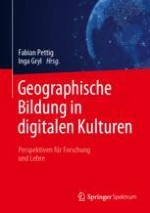2023 | OriginalPaper | Buchkapitel
10. Ungleichheit in geomedienbasierten Bildungskontexten
Beiträge einer intersektionalen und soziokritischen Perspektive zu Spatial Citizenship
verfasst von : Jana Pokraka
Erschienen in: Geographische Bildung in digitalen Kulturen
Verlag: Springer Berlin Heidelberg
Aktivieren Sie unsere intelligente Suche, um passende Fachinhalte oder Patente zu finden.
Wählen Sie Textabschnitte aus um mit Künstlicher Intelligenz passenden Patente zu finden. powered by
Markieren Sie Textabschnitte, um KI-gestützt weitere passende Inhalte zu finden. powered by
